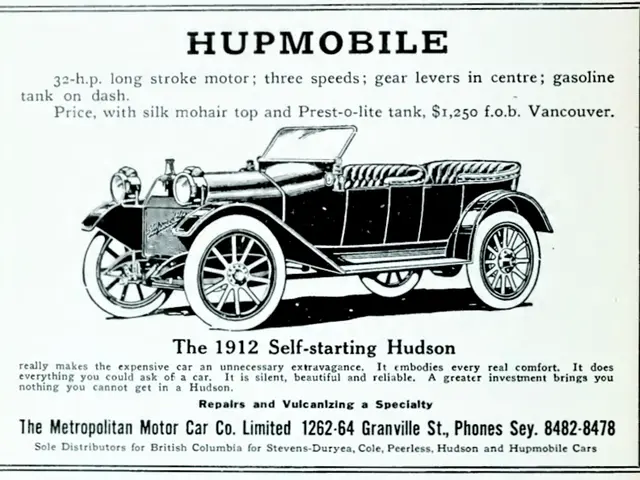Anticipated Timeline for Decrease in Car Loan Interest Rates
Revised Article:
When interest rates are on the rise, it can make a significant impact on every aspect of the economy, and auto loans are no exception. Despite the Federal Reserve keeping rates steady at their May meeting, they have still increased a total of 11 times between 2022 and 2023, with the range remaining at 4.25-4.5 percent. But what does this mean for financing a new set of wheels? Is it worth waiting for interest rates to drop, or should you bite the bullet and make a purchase now?
To shed some light on these questions, we sat down with our financial analyst expert, Greg McBride, to get the lowdown.
Expect a Tougher Road Ahead for Auto Loan Rates in 2025
Simply put, auto loan rates likely won't be dropping significantly this year. The main reason behind this is the Federal Reserve's ongoing efforts to subdue inflation. But it's not just higher interest rates that are making car loans more expensive in 2025.
"Higher interest rates do make borrowing more costly, but increased vehicle prices are another factor driving up the cost of financing a vehicle in 2025," explains McBride.
New car prices in 2025 were still over $10,000 higher than they were in 2020, according to Kelley Blue Book. And if you factor in the higher interest rates we've been experiencing over the past few years, that costs you even more.
Interest rates for both new and used vehicles have increased steadily since the pandemic began in 2020.
Is it a Good Time to Finance a Car?
Ultimately, the answer depends on your specific circumstances. If you already have a reliable set of wheels that can get you where you need to go, it might make more sense to stick with what you've got. But if you need a vehicle, expect to fork over more cash for financing, especially if you have bad credit.
Staying on the Hunt for Competitive Interest Rates with Poor Credit
It's worth noting that the Fed's decisions on interest rates have little impact on the interest rate you can secure when purchasing a car. Instead, it affects lenders' costs to provide funding for your purchase, which they ultimately pass on to borrowers.
"Lenders are tightening their lending criteria, making it tougher for those with poor credit histories to secure loans, and those that do get approved will likely face higher interest rates," says McBride.
For instance, borrowers with scores below 501 may face rates of over 19% for used car loans[1]. Unlike those with strong credit, bad credit borrowers don't have much negotiating power when it comes to securing the best available rates.
If you find yourself in this category, one strategy could be to secure financing assistance from a co-signer to benefit from better rates[2].
Cost vs. Interest Rates: Vehicle Prices Take the Cake
While interest rates have been surging at an alarming rate, it's important to remember that the biggest hit to your wallet might not be the increased interest rates. Instead, it's the soaring vehicle prices[3].
Although interest rates have increased at their fastest pace in 40 years, escalating vehicle prices have been causing consumers even more grief. Prices have remained high throughout the pandemic and have yet to return to pre-pandemic levels[4].
Even as car prices have stabilized slightly, the impact of higher interest rates can still offset any progress on the cost front.
Piecing Together the Best Auto Loan Deal
If you must purchase a car in 2025, there are steps you can take to still walk away with a good deal.
- Weigh your options: Shopping around for the best rate you can secure can save you extra money in the long run[6]. Remember to pay close attention to any additional fees that lenders may charge.
- Crunch the numbers: Don't forget to factor in vehicle ownership costs beyond just your monthly payment. Calculate the true all-in cost, which covers fuel, maintenance, and other expenses[6].
- Secure pre-approval: If your lender offers it, applying for loan pre-approval will give you a clear picture of your monthly payments[6].
- Go Electric: Driving an electric vehicle can not only save you money in the long run but can also be better for the environment. And with EV incentives available in some areas, you might even be able to recoup some costs[2].
But the most effective way to secure a competitive edge when it comes to auto loan financing is to make sure your credit is in great shape.
"A higher credit score can help you secure easier loan approval and better interest rates," advises McBride.
The Bottom Line
While no one can predict the future with certainty, it's looking like auto loan interest rates are unlikely to drop substantially anytime soon[7]. So make the most of this time by focusing on improving your credit, as better credit scores will mean access to more affordable loan options.
- Despite the Federal Reserve keeping rates steady at their May meeting, auto loan rates are not expected to drop significantly in 2025 due to the ongoing efforts to subdue inflation.
- High interest rates and increased vehicle prices are driving up the cost of financing a vehicle in 2025, and borrowers with bad credit histories are likely to face higher interest rates.
- If you find yourself in a poor credit category, securing financing assistance from a co-signer could help you benefit from better rates.
- Even though interest rates have been surging, the biggest hit to consumers' wallets might be the soaring vehicle prices, which have remained high throughout the pandemic and have yet to return to pre-pandemic levels.
- To secure a good auto loan deal in 2025, consider shopping around for the best rate, crunching the numbers, securing pre-approval, and potentially going electric if incentives are available.
- Improving your credit score is the most effective way to secure more affordable loan options for auto financing.







